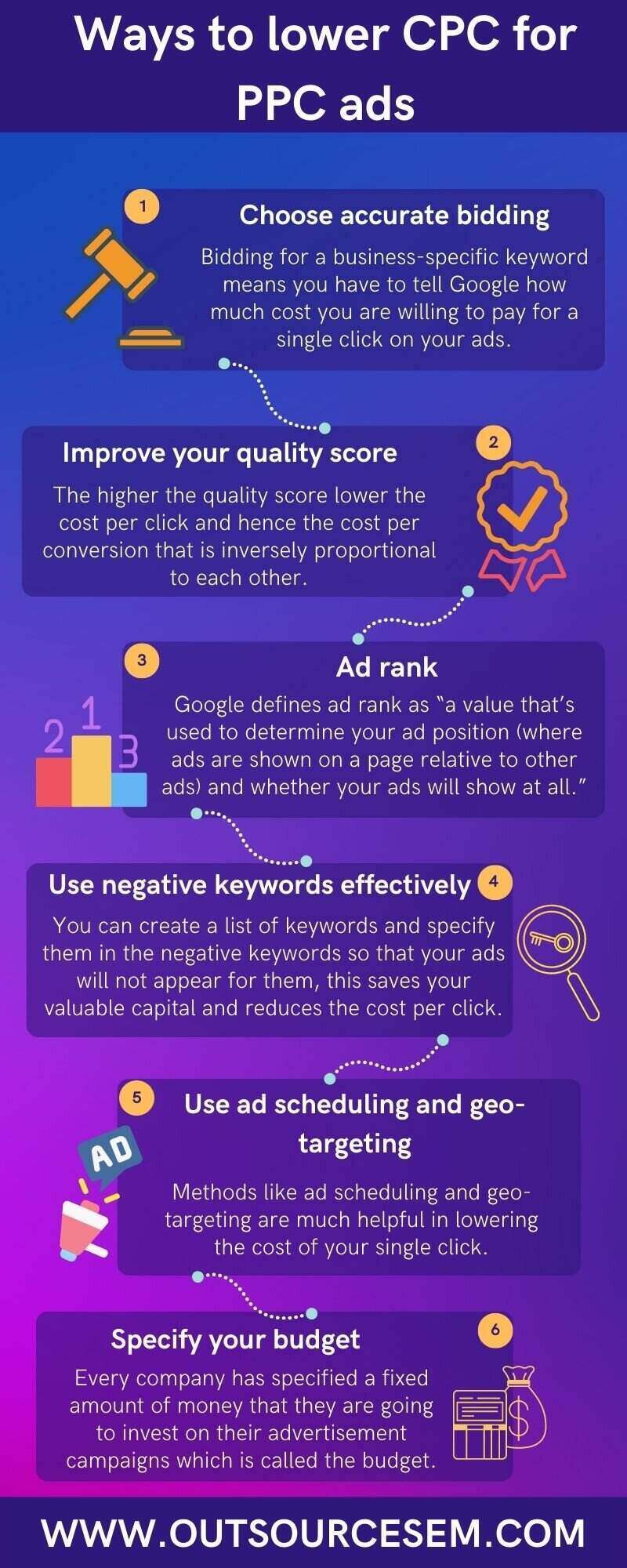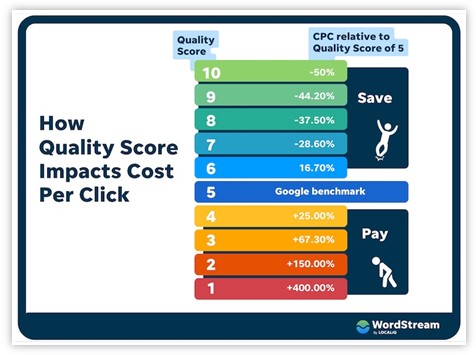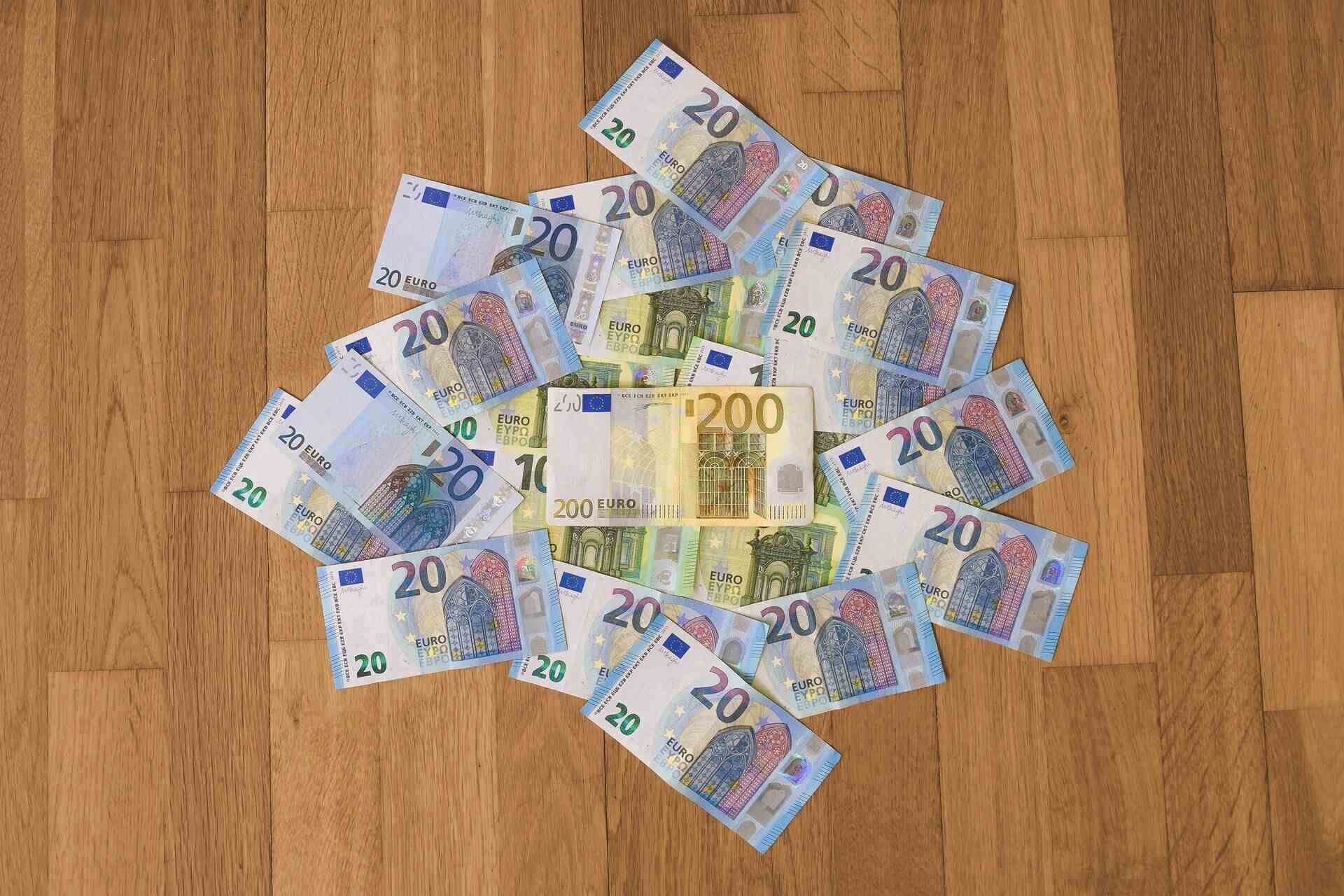The world of digital advertising encompasses many critical metrics to analyze the performance of PPC ads. In the digital marketing world, as there is intense competition in search engine optimization to rank higher on the search engine results pages, similarly, PPC advertising focuses on higher ad rank & position to generate quality leads, form fill up, etc. With the increase in online advertising among digital advertisers, keeping an eye on cost per click (CPC) is essential. If you are still unsure that pay-per-click advertising would help you to achieve your target goals, then you’ll be glad to know that businesses generally double their investment with the help of platforms like Google Ads. Let us see ahead in the blog what cost per click is, how to calculate it and how optimizing it improves the business ROI.

What is the cost per click?
Cost per click is a PPC metric that tells the cost of a single click on your PPC ads across search engines, social media platforms, etc., that offer paid advertising. Cost per click applies to all types of advertisements like image ads, video ads, text ads, display ads, etc. But this is the very simple definition of the CPC, which seems to be a typical metric, but CPC is much more than that. For every business owner or brand, the cost per click metric is crucial to understanding the whole expenditure in running the ad campaign and the return on investment (ROI). It also signifies the effectiveness and worthiness of your running ads; CPC is an essential metric as the click and costs associated with it are valuable and affect the significance of your PPC campaign. Clicks in the sense that it drives traffic to the website and costs as you have to pay for every click whether it is a conversion or not.

Importance of CPC
Cost per click can benefit in many ways, like analyzing the success of your pay-per-click advertising campaign, how your ad performs against your competitors, etc. CPC can also tell whether you need to modify your advertisement strategy; that helps to reach more users by spending less money. But CPC can be more important in terms of ROI and spending on advertising campaigns.
1. Return on investment - By analyzing the CPC, you can clearly understand how much you spend on your ads and how much you get as a return on your investment.
2. Expenditure on ads campaign - High CPC than the industry average CPC is not worthy, so it is better to focus on improving the quality of ads. You get to know which ad campaign or ad group works best for you.
How to calculate CPC and average CPC?
First, let's understand the difference between the actual CPC and average CPC; then, only you can jump to the CPC formula to calculate them. Actual CPC is the actual cost you have to pay per single click on your ad, while average CPC is the ratio of the total clicks cost to the total number of clicks. Now, the CPC formula is
Average CPC = Total cost of the clicks/total number of clicks
Actual CPC = Ad rank of the competitors/Quality score + $0.01
Suppose an advertiser pays a total amount of $200 for the PPC campaign and gets 50 clicks, then the average CPC is,
Average CPC = 200/50 = $4
Now, the ad rank of the competitor is 20; the quality score is 10, then the actual CPC is calculated below,
Actual CPC = 20/10 + 0.01 = $2.01
This actual CPC is the cost you must pay each time someone clicks on your PPC ads. You can also use the CPC calculator to calculate your cost per click.

Ways to lower CPC for PPC ads

PPC in digital marketing has its unique benefits, and it has a vital role in making your business successful. Still, suppose you would not optimize your ads campaign or focus on lowering its cost. In that case, it may be more than your business profitability, and eventually, you face a significant loss. That's why we are suggesting here some great tips that work for lowering your average CPC.
Factors that determine your Adwords CPC are quality score, competitors' ad rank, and maximum bid. First, let us discuss these factors and then explore others.
1. Choose accurate bidding - CPC bidding is quite crucial in pay-per-click advertising. Bidding for a business-specific keyword means you have to tell Google or search engines how much cost you are willing to pay for a single click on your ads; it is also referred to as maximum bidding. You can do this manually or tell search engines to select the most accurate bid for you, which is called automatic bidding. It is not necessary that setting a maximum bid means you have to pay the whole of it often. You may have been charged less or sometimes very less depending on other factors like quality score or ad rank of other advertisers bidding for the same keyword, ad relevancy, etc., which we will discuss in the following points.
Thus you have to be very careful while choosing a bid on your keywords relevant to your business that does not set a too-high bid that you suffer a loss or not too low that you are not able to drive conversions and clicks.
2. Improve your quality score - If you want to rank higher by spending less amount of money, then you should focus on improving your quality score as it has a direct relationship with the cost per click and hence the cost per conversion. The higher the quality score, the lower the cost per click that is inversely proportional to each other.
High quality score = low CPC & low CPC

The average quality score is 5, but if you keep it to 6 or higher, you can significantly lower your CPC by 16-50%. The image above by WordStream clearly states how QS below 5 can maximize your CPC, while a score above 5 can save up to 50% of your money. Thus, you must think about improving your quality score. Now the QS depends on three main factors, i.e.,
• Expected click-through rate (CTR),
• Ad relevancy,
• Landing page experience
Thus, you need to work on all these factors separately in order to improve your QS and lower your cost per click.
3. Ad rank - Google defines ad rank as “a value used to determine your ad position (where ads are shown on a page relative to other ads) and whether your ads will show at all.” Thus you can work on improving your ad rank by focusing on some factors like
• Enhancing the relevancy of your ad
• Optimizing your landing page experience
• Effectively optimizing your ad extensions like location, site, callout, price, image, promotion, call, lead-out, etc. based on your campaign goals
Apart from these three below are some other factors on which you can focus that help lower your CPC in a white label PPC campaign.
4. Use negative keywords effectively - Negative keywords can be used strategically to optimize your PPC campaign effectively. By using negative keywords, you can block your ads from showing up for the set of keywords that you do not want your ads to appear. You can create a list of keywords and specify them in the negative keywords so that your ads will not appear for them; this saves your valuable capital and reduces the cost per click. Also, avoid bidding for keywords irrelevant to your business, highly competitive, and generic terms. You can go for long-tail keywords in your business and bid on them.
5. Use ad scheduling and geo-targeting - Other methods that can be used to lower your Adwords CPC are ad scheduling and geo-targeting. With the help of ad scheduling, you can trigger your ads at that time of the day when your business targeted audiences are more likely to be active. Similarly, geo-targeting ensures that your ads are active at the location where you can get more conversions than other places. Also, you can try to improve your performance in the areas where you wish your ads to perform better.
6. Specify your budget - PPC in digital marketing has a crucial role in your paid campaigns' success. You should not miss a single chance to promote your brand or business. But, every company has specified a fixed amount of money that they will invest in their advertisement campaigns, called the budget. This budget can vary from company to company, depending on the company's profitability. So, you should also set your budget to spend on your PPC campaign and be alert that it does not overspend than the budget specified.

Google Ads, formerly known as Google Adwords, is one of the most popular advertising platforms where you can run PPC ads and track your performance. But you can also run Bing Ads and social media ads to get more visibility.
What is an ideal CPC?
The ideal Google Adwords CPC can vary widely depending on the industry, but in general, it is found that the average CPC across all industries is about $2. If you pay more than your industry average or $2, then you should pay more than the average. At this time, you should stop and think about improving your PPC advertising strategy. If you are not getting clicks or traffic on your website compared to what you are paying, it is a sign that you have missed something important. This point needs to be addressed to achieve the desired business goals. At this stage, you can contact or hire a digital marketing company that provides you white label PPC services, PPC reports, campaign analysis, keyword research, lead generation, online reputation management, etc.
Difference between CPC and CPM
As PPC metrics are vital to track when running an advertising campaign, CPC and CPM are two terms that may be confusing. CPM is expanded for cost-per-mille or cost-per-thousand-impressions (views). It is mainly suitable for display, video, or branding-oriented campaigns. It is also a pricing model where an advertiser has to pay some fixed amount of money when their ad is viewed per thousand times. It does not matter whether your ad is clicked or not. Suppose you are bidding $2 as a cost per thousand views; if your ad is seen 100,000 times, then the total amount you have to pay is $100, whereas CPC is payable only when your ad is clicked, as discussed above.
Conclusion
Almost every brand invests heavily in its marketing & promotion, and no doubt that this investment is worthwhile. But only running ad campaigns and not measuring the associated stats can be a huge mistake. It becomes crucial that you monitor your ad campaigns' effectiveness. These are why various digital marketing metrics are used and analyzed to improve PPC or SEO campaigns. Cost per click is one metric, but you must work on numerous PPC metrics to reduce the cost of one click as you cannot stop at this point to get conversions for a victorious campaign. Different businesses have different goals, requiring expertise to manage ad campaigns. You can outsource PPC ad services, offshore PPC services, etc., to get in touch with PPC experts that have mastery in optimizing ad campaigns. Moreover, by hiring our PPC experts you can avail various other services like lawyer PPC, small business PPC, plumbing PPC, painting PPC, appliance repair PPC and etc for your home business. All these services are a cost effective method of driving traffic to your website.Along with being cost effective they provide immediate results.
References
• CPC (Cost per Click) explained
• What is cost per click (CPC)? 9 tried and tested ways to optimize your advertising campaigns
